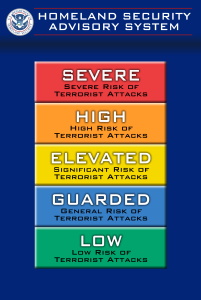
DHS rethinks the terror alert system it never used
DHS Secretary Jeh Johnson said the department is considering revising the four-year-old National Terrorism Advisory System to keep pace with how threats have ev...
The Homeland Security Department is having second thoughts about its system to alert the public about terrorism threats.
It has good reasons for the double take. The National Terrorism Advisory System (NTAS) has never issued a warning in its four years. The system’s Twitter handle, @NTASAlerts, has gathered 23,500 followers without a single tweet. Its Facebook page is liked by 33,864 people, but its timeline has no posts.
“I will tell you that we are considering revising our NTAS system, the National Threat Advisory System, which we’ve never used,” DHS Secretary Jeh Johnson said in a speech to an audience of military personnel, defense contractors and media gathered for the Association of the U.S. Army annual meeting in Washington. “I’ve asked our folks to consider whether we should revise that system to accommodate how the terrorist threat has evolved. That review is underway now,”
Whereas people recruited, trained and equipped by known overseas terrorist organizations were once the most likely to attempt attacks, that’s no longer the case. Those inspired, but not formally part of terrorist organizations, represent a newer threat that is harder for the government to detect. Recent attacks on military facilities in Chattanooga, Tennessee and the French satire magazine Charlie Hebdo are examples of this evolution in terrorism, Johnson said.
He did not say when the review would be completed. A spokesperson for the department said it had no additional information to share at this time.
DHS, under then-Secretary Janet Napolitano, launched the National Terrorism Advisory System in April 2011. It replaced the rainbow-hued Homeland Security Advisory System, which critics called confusing and vague.

“The old color-coded system taught Americans to be scared, not prepared. Each and every time the threat level was raised, very rarely did the public know the reason, how to proceed, or for how long to be on alert,” Rep. Bennie Thompson (D-Miss.), the top Democrat on the House Homeland Security Committee, said at the time.
DHS promised the new system would provide more detailed, region-specific information about just two types of threats — those that were “imminent” or just “elevated.” DHS would coordinate with other federal agencies before issuing alerts only to those who might be affected by them.
The department advertised the system as part of its “If you see something, say something” campaign to encourage people to report suspicious activity. DHS relaunched the campaign in January to coincide with the Super Bowl.
“‘If you see something, say something’ has to mean more than a slogan. We’re asking the public for help, public awareness and public vigilance,” Johnson said.
DHS opens Office of Community Partnerships
DHS also is trying to renewing ties with Muslim communities in the face of the Islamic State’s aggressive campaign to recruit young Americans. DHS’ new Office of Community Partnerships will take the government’s efforts to counter violent extremism “to a new level,” Johnson said.
The office will encourage the tech industry to aid communities in spreading their messages, he said. It also will engage philanthropies and grant-making programs that can provide additional resources for communities’ anti-extremism activities.
Johnson appointed George Selim in late September to lead the office. Selim, a DHS veteran, has held a similar position at the National Security Council. His deputy is David Gersten, who has coordinated DHS’ activities in this area. Both Selim and Gersten are well known to Muslim communities, Johnson said at the time.
Copyright © 2024 Federal News Network. All rights reserved. This website is not intended for users located within the European Economic Area.


